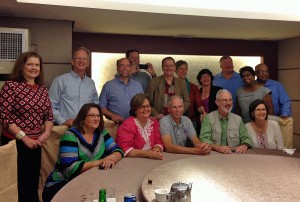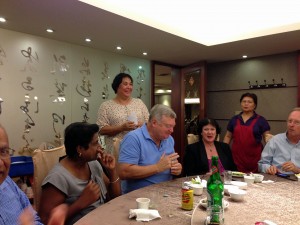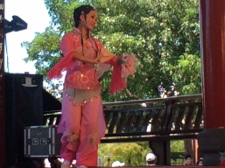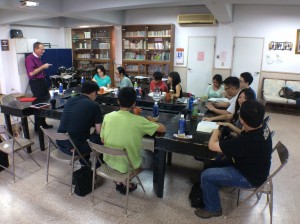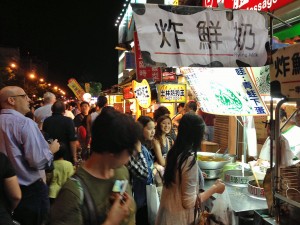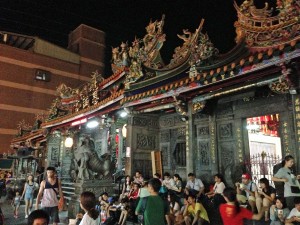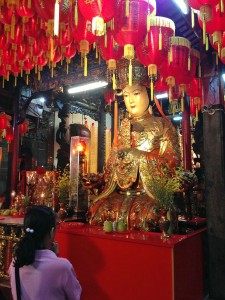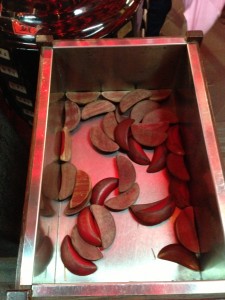Saturday morning, and I am drained. And maybe a little stir-crazy. Hotels are not my preferred venue. They always make me feel a little trapped, even a nice one (and the Grand is very nice). Friday night we had dinner together (all the bishops of my class along with available spouses) in this great little restaurant run by a real character, and that helped; but with news of the typhoon coming, I am ready to get out into the open air.
We board the buses and head to Yilan, the site of the Cultural Heritage Center. I have no idea what to expect, but the weather is bright and sunny. I’m getting used to the heat. When we get there, Kirk Smith, the Bishop of Arizona (who else?) offers me sunscreen, which I am grateful for, and off we go through the gates.
The campus looks like a combination of a community college with a piece of Disney World dropped in. There is a “traditional” Taiwanese street with crafts shops on both sides, leading to a broad plaza, which in turn leads to a cultural museum, a theater, a library and other facilities. The place is made for casual wandering around, marked by a few scheduled events.
So that is pretty much what we do: wander around. I browse a little in all the shops. Betsy has sent me on a mission for a Chinese jacket, but nothing comes close to what I know she would like. I go into the Cultural Museum where there is an exhibition of metalwork from three families who are traditional smiths, including a collection of traditional headdresses which are gorgeous, and a series of silver statues representing the Eight Immortals (just google it: I didn’t know who they were either), that are so brilliant I am strongly tempted to break the NO PHOTOGRAPHY rule shouting at me from signs every five feet (Headline in the Taipei Times: “American Bishop Arrested for Public Disrespect”). Afterwards I catch, and manage to video, a great drum show by a group of young percussionists, and people who see me with a video rig, gently tap me on the shoulder and offer me their seats so I can get closer (honestly, these people are almost as kind as Pittsburghers!).
No sooner do I head back into the main street when I run into a crowd lining both sides. Something is up: a parade, I think. Actually it’s a lot more. There is a huge commotion as an actor dressed as a magistrate complete with judges table on a wheeled platform, announces what is obviously the prologue to a play. And the drama is enacted over the next half-hour up and down the street. It’s a lot of fun: over-the-top western style melodrama meets traditional Chinese dance and acrobatics.
The cast are all young. In my checkered past, I once had a job like this. I worked as an actor for the Great American Melodrama and Vaudeville Theatre in Oceano, California: forty bucks a week plus housing. (Since there wasn’t a whole lot to do in Oceano, I actually saved money). We put on a 19th century melodrama, followed by a vaudeville show, and we waited tables during the intermission, bringing customers hot dogs, sodas and beer.
But you wouldn’t have needed this skilled professional background to recognize the characters: young man comes from the country to the city, sees beautiful princess from afar, corrupt Snidely Whiplash-type police inspector (interesting: remember it’s China) kidnaps girl, mysterious hero drops out of the sky to rescue her (lots of pretty cool swinging around on cables and rooftops here). Hero is tricked, captured, put into a torture-box and magically disappears. He falls in love too, but realizes the girl’s heart is with the weedy young guy who can’t seem to do anything but get into trouble; hero rescues maiden; police inspector cries, Curses! Foiled Again! Lots of dancing and singing as Happy Couple goes off into Looming Typhoon (sometimes reality gets in the way of art).
It’s all great fun, we have a wonderful lunch, and get back on the buses. By the time we get back to the hotel, I’d really like a nap, but instead I change into a collar and head to the Church of the Good Shepherd with it’s rector, Lily Chang, to meet with a group of young people for Bible Study.
I had arranged in advance to participate in two Bible Studies in Taiwan. This is part of an initiative begun by the Archbishop of Canterbury a few years ago, called The Bible in the Life of the Church. There are three goals: Goal One is to help people across the Church become deeply and prayerfully formed in the Scriptures. Goal Two is to see how different people in the various parts of the Anglican Communion actually live with and under the Word of God: how do they read texts, what lessons do they draw, how does the Word dwell with them? Goal Three is to connect these people across barriers of geography and culture, so that their readings can inform each other and they might gain an appreciation for the breadth of the Body of Christ. So, I am toting a video rig across half the world, sitting with women in East Africa, young adults in Taiwan, students in Manila and farmers in Capul in the Philippines, and finally bringing it all back home to Pittsburgh, where we will join this global community of study. To keep the focus, we are working on one text across all these places: the Parable of the Sower and the Seed in Mark 4: 1-20, and if you don’t know it well, I’d suggest you take a couple of minutes to read it now!
Goal One is to help people across the Church become deeply and prayerfully formed in the Scriptures. As Lily drives me to the Church, she tells me a little of its story. She has been rector there 11 years. The parish is approaching its fiftieth anniversary. Two services are offered every Sunday, one in Mandarin and one in English. The Vestry is bilingual. The average Sunday attendance is about 100. They run a kindergarten for 140 kids, and are planting a church in Chung Li that already has about twenty members. During the summers, they have a camp for youth. The first year it drew thirty-five, seventy in 2013, and 150 this year. I ask her how they figured out what this would look like, and she laughs. “We have no idea,” she says. “We just do it!” (Note to self: trust God).
It is a wonderful hour and a half. (I am always so invigorated by teaching and studying Scripture). After a prayer we go around the room and read the passage aloud a verse at a time, first in English, then in Chinese. I give a summary, then I divide the class into three groups of four, and give each an assignment: one groups takes the hard ground, the second stony ground, the third thorny ground. My question: where are these things in your life? what is the hard ground that keeps you from hearing the Word, the stones that you fear, the thorns that oppress, lure or distract you? They get ten minutes. Their conversation is vigorous. When they come back we spend the rest of the time comparing notes. Two things stand out.
First, the thorns: there is huge pressure on young people in Taiwan to succeed, to make money, to have status. Their professional lives are very busy and compete with everything else. The question of what God wants them to do, how he wants them to live, often gets shoved into the background by the sheer forces of worldly life.
Second, the stones: if young people contemplate becoming Christian, and this becomes known to their non-Christian parents, the first thing they get hit with is the Confucian charge of abandoning filial piety. As Bishop David told us, the absolute duty of adult children is to make sure their parents are cared for in the afterlife, notably by bringing food offerings for them once a month. Christians, of course, do not practice this, not because Christians hate their parents, but because they believe it crosses the line between veneration and idolatry. This perception gives Christian young people a stigma in the eyes of many of their peers.
I am fascinated by the difference between these two problems. The first complaint you could hear coming from young Christians in any affluent and ambitious environment: from Mount Lebanon to the North Hills to New York City. The second complaint is specifically Chinese and has been the same since Fr. Mateo Ricci first brought the Gospel five hundred years ago! When we turn to the question of what makes up the good soil, we come up with various answers: prayer, grace, the Church. It is clear these folks know they can’t produce fruit on their own. Remember, says one, the point of the story is that God is doing it, not us. I think of Saint Paul’s clarity in 1 Corinthians: I planted, Apollos watered, but God gave the growth. After a little more prayer and — you guessed it– a group photo, Lily drives me back to the hotel.
I change and have a quick dinner and am just in time for the last outing of the day: the Night Market in Taipei. There is a huge crowd of bishops and spouses headed out for this one– three buses full– and the young people of the diocese are our chaperones. They couldn’t be kinder. I’m in a group with a two other bishops, and Daisy, one of my young students from Good Shepherd, is our main guide.
Boy, do we need her! The buses let us out at the fringes of the market and we wade in. It is vibrant, crowded, noisy, packed with food stalls, shops of all kinds, selling mainly consumer goods, not touristy things– clothing, shoes, cosmetics.
Retail in Taiwan is energy-intensive: every shop has a hawker standing outside, some with bullhorns, competing for the attention of the crowds. We stroll around for forty-five minutes or so when Daisy runs into a friend. Have you shown them the Temple? he asks. So we head down another labyrinth of streets to what turns out to be the center of the neighborhood: the Temple of the Sea Goddess.
The contrast is jaw-dropping. This ancient structure, founded in 1796, was built when there was nothing here, and the market grew up around it over the next two hundred years. The courtyard is packed with people sitting or standing, mainly taking a break from the crush in the streets, many of them having a quick dinner. Inside the statues of the gods, the carved stone and painted wood, take us back centuries. Some of it is very beautiful, but you can also see the total trap of this kind of worship, the slavery under the beauty: offerings are made, then lots are thrown to see what the future might hold. It feels to me like a combination of a casino and a bribery center, cajoling the spirits to get them to do what you want, and banking on an auspicious twist of fate.
If there is any clearer expression of the cultures need for the Gospel, I don’t know it.
When I get back to the hotel, though, and look over the day, I wonder how different we really are from this in Pittsburgh. There are people around us every day who gave up on God a long time ago, but when something bad happens, try bargaining with God. We ourselves are torn by thorns and hurt by stones and manufacture all kinds of hard ground to get away from the Gospel. And we keep getting confronted with a choice: do we want to live a life that is not much more than our own personal melodrama– peopled with out own heroes and villains, under the control of some fantasy we are hoping for, a life lived in a shadow street, a poor replica of the abundant Life God offers– or do we want the real thing, the fulness of His Grace and mercy, the lush grain that pushes through the hard and stony and thorny soil bearing fruit ten- and sixty- and a hundredfold? The answer is obvious. As I turn out the light by my bed, I pray briefly, for Betsy and Evan, for the Diocese of Pittsburgh, for my fellow bishops, for the Church in Taiwan. Then I hear myself saying, I’ll take the real life, Father, please. Amen. And I turn out the light and go to sleep.

